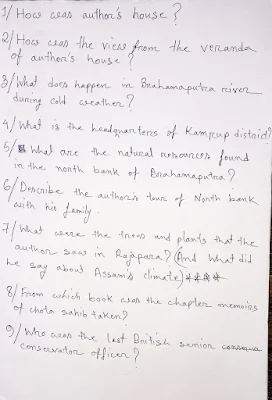📚 Memoirs of a Chota Sahib Important Questions and Answers
Short Answer Questions:
Q1. Who is the ‘Chota Sahib’ referred to in the story?
Ans: The ‘Chota Sahib’ refers to John Rowntree, the author of the story. The term ‘Chota Sahib’ was used in British India for young British officers who were new to India and held lower ranks in the British administrative system.
Q2. Why was John Rowntree posted in Assam?
Ans: John Rowntree was posted in Assam as a British officer in the Indian Civil Service (ICS). He served as an assistant commissioner in Assam during the British colonial period, and his memoirs describe his experiences during that time.
Q3. How does the author describe the beauty of Assam?
Ans: The author beautifully describes Assam as a land of enchanting beauty, with its lush green hills, flowing rivers, and breathtaking landscapes. He vividly captures the picturesque tea gardens, serene environment, and the vibrant culture of Assam.
Q4. How did John Rowntree find the lifestyle of the people in Assam?
Ans: John Rowntree observed that the people of Assam led simple, peaceful, and content lives. He appreciated their hospitality, warmth, and the rich cultural heritage they preserved.
Q5. What is the significance of the title ‘Memoirs of a Chota Sahib’?
Ans: The title reflects the personal recollections of John Rowntree during his tenure in Assam as a young British officer. It gives a glimpse of colonial India from the perspective of a ‘Chota Sahib’ (junior officer).
Long Answer Questions:
Q1. How did John Rowntree’s perspective towards India change over time?
Ans: Initially, John Rowntree viewed India with a colonial mindset, seeing it as an unfamiliar and exotic land. However, as he spent more time in Assam, he developed a deep appreciation for the land, its people, and its culture. His experiences gave him a nuanced understanding of Indian society, and he began to respect and admire the simplicity and warmth of the people.
Q2. Describe the relationship between John Rowntree and the local people.
Ans: John Rowntree had a cordial and respectful relationship with the local people of Assam. He admired their hospitality and warmth. Despite being a British officer, he did not distance himself from the natives but rather tried to understand and adapt to their way of life. His genuine interest in the local culture and traditions made him well-liked among the people.
Q3. Discuss the humorous incidents mentioned by John Rowntree in his memoirs.
Ans: John Rowntree’s memoirs include several humorous anecdotes that reflect the lighter side of his life as a British officer in Assam. One such incident involves his encounter with mischievous monkeys who created chaos in his bungalow. His humorous and light-hearted narration of such incidents adds charm to his memoirs.
Q4. How did John Rowntree depict the challenges of a British officer in India?
Ans: John Rowntree portrayed the challenges faced by British officers in colonial India, such as adjusting to the extreme climate, adapting to unfamiliar surroundings, and managing administrative responsibilities in remote areas. Despite these challenges, he approached his role with dedication and gradually adapted to life in Assam.
Analytical Questions:
Q1. Analyze the theme of cultural exchange in ‘Memoirs of a Chota Sahib.’
Ans: The theme of cultural exchange is prominent in Memoirs of a Chota Sahib. John Rowntree’s interactions with the local people, his appreciation of their customs and traditions, and his efforts to learn about their way of life highlight the exchange of ideas and experiences between the British officers and the native population. His memoirs provide a balanced portrayal of British-Indian interactions during the colonial period.
Q2. Do you think John Rowntree’s narrative gives an unbiased account of colonial India? Justify your answer.
Ans: While John Rowntree’s narrative provides a detailed and vivid description of colonial India, his perspective is that of a British officer, which may inherently contain a colonial bias. However, his memoirs are relatively objective, as he makes an honest effort to understand and appreciate Indian culture and acknowledges the warmth and simplicity of the local people.
✅ Pro Tip for Exams: Focus on themes like cultural exchange, British-Indian relationships, and humorous anecdotes while preparing answers from Memoirs of a Chota Sahib. Pay attention to both short and long answer questions to ensure full coverage.
Coronavirus | COVID-19 | Paragraph Writing |






